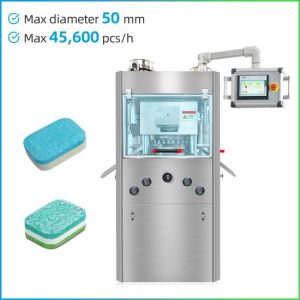Especially when invested in pharmaceutical industry where an automatic table press machine is continuously needed to run, the reliability of machineries impresses almost everyone. These tablets are designed to deliver maximum efficiencies and outputs on round-the-clock production schedules without sacrificing the quality of your tablet. In this article, we will explore some of the distinguishing characteristics and operating norms that are part of what make these machines reliable.
Robust Mechanical Design
Mechanical Design Aspect- The topmost requirement possible for an automatic tablet press machine is its mechanical design which will be a back bone related to reliability. Made from the best quality stainless steel, these machines meticulously cope with almost half of rigorous compression received by this tablet. Wear-resistant punches and dies are generally manufactured from hardened tool grade steel which undergoes millions of cycles before it needs to be replaced. For example, several million compressions per set of punches and dies is achievable with some upper-tier models out there.
Advanced Control Systems
The control systems used in automatic tablet presses are more advanced, to help create uniform operational stability and guide key performance metrics. These systems control the rate, pressure and depth with which each tablet is filled to meet desired standards. Real-time feedback enable it to catch and remedy any variance from its set quality standards, which in the long run is essential for reliability. For instance, certain machines come with weight variation tolerance limits of ±0.5%, which results in the production error probability at generous scales significantly diminished for nearly all part ranges ().
Automated Lubrication Systems
Ongoing operation requires ongoing maintenance solutions. Reliability of the tablet press itself is further enhanced by automated lubrication systems, which help ensure optimal application to wear points achieved under positive pressure. By doing so, it extends the life and ensures a cooler running operation of components. Most apply a programmable logic controller to consistently deliver correct amounts of lubricant at set points in time, automatically maximizing equipment efficiency.
Heat Dissipation Features
Temperature control is crucial to consistent operation, because overheating can cause mechanical breakdown and degrade tablet quality. Aerospace-specific designs for cooling systems come into play, with fans and heat exchangers to keep everything at the correct operating temperature. Getting rid of that heat helps ensure the components in the machine do not get too hot, a policy to keep things from running at temperatures well above what they are designed for and throwing off reliability.

Redundancy and Error Recovery
For several commercial reasons, best-in-class automated tablet presses have partly-everything aspects and fault tolerance mechanisms to keep them in production. If a single part of the machine fails there may still be other operational systems (dual control units, backup power supplies) to hold operations in case if primary Systems failed to perform their job. The error recovery features can also help the machine to return quickly from minor faults that may lead to any downtime.
Predictive Maintenance Tools
Automatic tablet presses incorporating predictive maintenance technologies are becoming more and more popular. These preventive maintenance tools forecast upcoming machine falterings by utilizing data analytics and completing it before the failure occurs. Functional areas of the engines are monitored by sensors that record data on vibration, temperature and other essential decameters that an AI achieves wearability through symbolic analysis. This approach certainly will prevent any surprise breakdowns and increase the machine's lifespan.
Final Thoughts
Constructing it of sturdy material, outfitting the automatic tablet press machine with robotics for sophisticated automation and ensuring regular maintenance will enhance its reliability as a heavy-duty equipment that runs around the clock. They are manufactured to implement the most rigorous requirements of pharmaceutical industries with a view for continuous top-performance tablet productions. These vehicles are engineering marvels and testaments to the thoughtfulness in design that went into making them constantly function without much downtimes.
